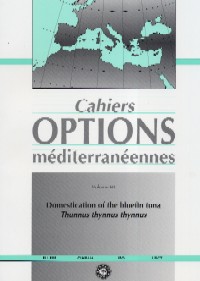| Article précédent | p. 145-148 | Article suivant |
How can resistant genotypes of Dactylis glomerata L. survive severe Mediterranean summer drought?
Volaire F., Lelièvre F.
Under intense summer drought conditions in the Mediterranean, most perennial forage grasses cannot support growth or development, and have to survive to grow again after the autumn rains. Adaptive response of cocksfoot, which survives drought by delaying dehydration or by favouring desiccation tolerance, has been analysed in several field experiments and under controlled conditions. The traits that are highly related to better survival rates are: heading earliness, depth of the root system, water uptake at low soil water potential, high soluble sugar reserves, and build-up of dehydrins which are likely to confer tolerance to drying of surviving organs.
- [ Afficher ]
- [ Télécharger ]
- [ Exporter la citation ]
Vous pouvez télécharger la citation au format :
- [ Imprimer ]
-
Mots-clés
DACTYLIS GLOMERATA, DESHYDRATATION, RESISTANCE A LA SECHERESSE, SYSTEME RACINAIRECiter cet article
Volaire F., Lelièvre F. How can resistant genotypes of Dactylis glomerata L. survive severe Mediterranean summer drought?. In : Ferchichi A. (comp.), Ferchichi A. (collab.). Réhabilitation des pâturages et des parcours en milieux méditerranéens . Zaragoza : CIHEAM, 2004. p. 145-148. (Cahiers Options Méditerranéennes; n. 62). 11. Réunion du Sous-Réseau Ressources Fourragères Méditerranéennes du Réseau Coopératif Interrégional FAO-CIHEAM de Recherche et Développement sur les Pâturages et les Cultures Fourragères, 2002/10/29-2002/11/01, Djerba (Tunisia). http://om.ciheam.org/om/pdf/c62/04600148.pdf



